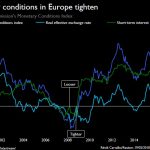The centerpiece of President Trump’s tax plan is a 15 percent corporate tax rate.
Republicans in Congress aren’t quite as aggressive. The House GOP plan envisions a 20 percent corporate tax rate, while Senate Republicans have yet to coalesce around a specific plan.
Notwithstanding the absence of a unified approach, you would think that the stage is set for a big reduction in America’s anti-competitive corporate tax rate, which is the highest in the developed world (if not the entire world) and creates big disadvantages for American workers and companies.
If only.
While I am hopeful something will happen, there are lots of potential pitfalls, including the “border-adjustable tax” in the House plan. This risky revenue-raiser has created needless opposition from major segments of the business community and could sabotage the entire process. And I also worry that momentum for tax cuts and tax reform will erode if Trump doesn’t get serious about spending restraint.
Internationally Speaking
What makes this especially frustrating is that so many other nations have successfully slashed their corporate tax rates and the results are uniformly positive.
My colleague Chris Edwards recently shared the findings from an illuminating study published by the London-based Centre for Policy Studies. It examines what’s happened in the United Kingdom as the corporate tax rates has dropped from 35 percent to 20 percent over the past 30 years. Here’s some of what Chris wrote about this report.
New evidence comes from Britain… It shows the tax rate falling from 35 percent to 20 percent since the late 1980s and corporate tax revenues as a percentage of gross domestic product (GDP) trending upwards. As the rate has fallen, the tax base has grown more than enough to keep money pouring into the Treasury. …the CPS study says, “In 1982-83 when the rate was 52%, corporation tax receipts yielded revenues equivalent to 2% of GDP. Corporation tax now raises over 2.3% of GDP when the headline rate is at just 20%.”














Leave A Comment